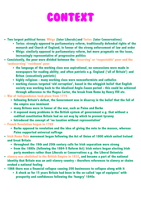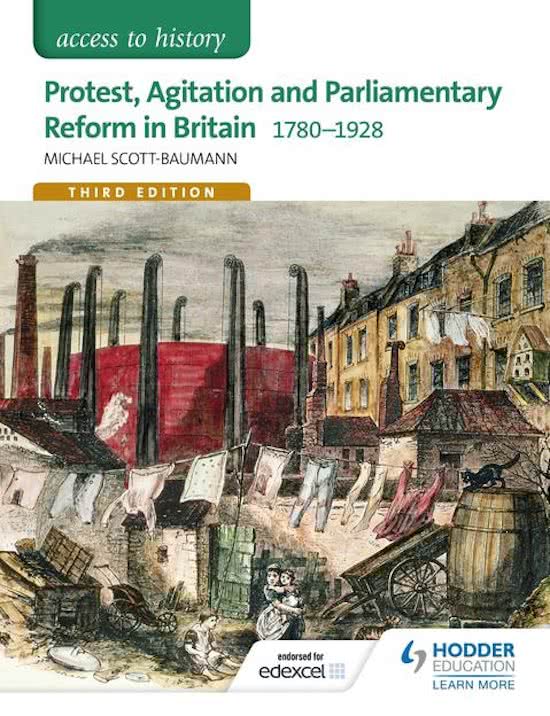Context
• Two largest political forces: Whigs (later Liberals)and Tories (later Conservatives)
• Tories: strongly opposed to parliamentary reform, traditionally defended rights of the
monarch and Church of England, in favour of the strong enforcement of law and order
• Whigs: similarly opposed to parliamentary reform, but more pragmatic on the issue,
increasingly representative of progressive politics
• Consistently, the poor were divided between the ‘deserving’ or ‘respectable’ poor and the
‘undeserving’ ‘residuum’ poor
• the language of the working class was aspirational, no concessions were made in
newspapers for reading ability; and often patriotic e.g. England (‘all of Britain’) and
Briton (evocatively patriotic)
• highly religious - many working class were nonconformists and catholics
• working classes targeted ‘old corruption’, based in the whiggish belief that English
society was working back to the idealised Anglo-Saxon period - this could be achieved
through adherence to the Magna Carter, the break from Rome by Henry VIII etc.
• War of Independence took place from 1775
• following Britain’s defeat, the Government was in disarray in the belief that the fall of
the empire was imminent
• many Britons were in favour of the war, such as Paine and Burke
• it exposed many problems in the British system of government e.g. that without a
codified constitution Britain had no set way by which to prevent tyranny
• Introduced the concept of ‘no taxation without representation’
• French Revolution began in 1789
• Burke opposed to revolution and the idea of giving the vote to the masses, whereas
Paine supported universal suffrage
• Irish Home Rule movement began following the Act of Union of 1800 which united Ireland
and Great Britain
• throughout the 19th and 20th century calls for Irish separatism were strong
• from the 1880s (following the 1884-5 Reform Act) Irish voters began electing Irish
party members rather than Liberals or Conservatives e.g. the Liberal Unionists
• slavery was abolished in the British Empire in 1833, and became a part of the national
identity that Britain was an anti-slavery country - therefore references to slavery or chains
evoked a national feeling
• 1866 there was a financial collapse causing 200 businesses to collapse along with it
• A shock as for 15 years Britain had been in the so-called ‘age of equipose’ with
prosperity and confidences following the ‘hungry’ 1840s





